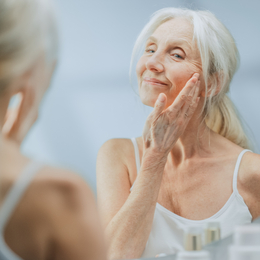
Ahead of Time
Age with grace, or age with defiance? You decide.
Some older adults choose to age gracefully. Others prefer a more defiant stance, refusing to cede ground to the encroachments of Father Time. Face-lifts. Intensive skincare regimens. Dermal fillers, laser skin resurfacing, and injections of botulinum toxin. Hair coloring, if not hair restoration. The list of age-defying interventions goes on and on.
Good skin care should be of the highest priority as we age, because older skin tends to thin, lose elasticity, and retain water less easily. It’s certainly worthwhile to consult a dermatologist or another qualified skincare professional to help determine the best path forward. Likewise, several small but important lifestyle changes can help care for the skin as we reach our 60s and 70s, according to the American Academy of Dermatology Association. The association’s many recommendations include using a gentle, moisturizing soap, cleanser, or body wash, paired with a fragrance-free moisturizer formulated for dry skin within three minutes of bathing and throughout the day.
Spending some time in the sun can be healthy, yet excessive sun exposure causes skin damage and can also increase the likelihood of developing skin cancer. Good advice from the National Institute on Aging: Limit time spent in the sun, especially in the hours between 10 a.m. and 4 p.m.; use broad-spectrum sunscreen with an SPF of 15 or greater; and wear protective clothing such as wide-brimmed hats and long-sleeved shirts, as well as sunglasses with UV protection, for times when sun exposure is unavoidable.
While healthy skin goes a long way toward warding off the signs of aging, it’s only one piece of the puzzle. Older adults should also strive to retain muscle mass, improve flexibility, and maintain good posture and a healthy weight. Likewise, confidence boosters such as hair, makeup, and wardrobe also play significant roles in how we express ourselves and are perceived by others. Wearing colors that accentuate our best features, including eye color and skin tone, can help our cause.
“Looks aren’t everything,” as the saying goes, but the image we see when we look in the mirror can have a significant effect on how we feel about ourselves, which, in turn, can influence other aspects of our lives. Older adults can look and feel good by focusing on some key objectives, according to the folks from HelpGuide.org: coping with change (i.e., accepting the fact that aging is a natural part of life), finding meaning and joy in our daily lives, staying connected to others, getting or staying active, and maintaining a sharp mind.
The expertise of an informed dietician can do wonders for the body at any age, as one’s diet can have a direct impact on how we age. An imbalanced or nutrient-spare diet, such as one containing too much salt or sugar, can contribute to premature aging; even worse, it has the potential to cause life-threatening conditions such as heart disease, stroke, and diabetes.
Also, one must consider the roles of sleep, exercise, and hydration. The body will let us know if we’re forgoing workouts, not getting enough shuteye, or not drinking enough water, so staying attuned to those biological reminders can help us stay sharp, stay strong, and prepared to face whatever the day brings.
Published (and copyrighted) in Suburban Life magazine, May 2024


